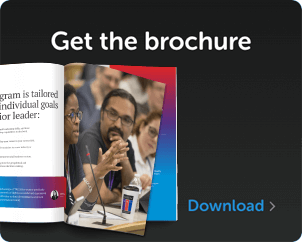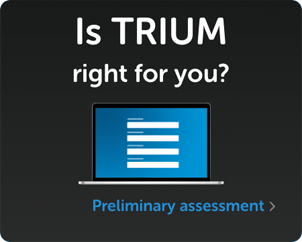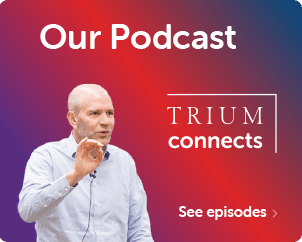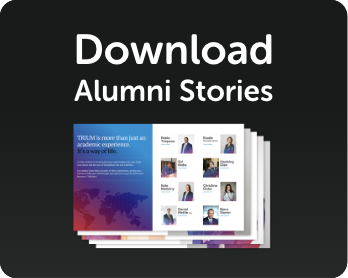

Faculty profile: Dr Andrew Walter
“I see TRIUM as a kind of insurance policy in a deeply uncertain world.”
Dr. Andrew Walter is Professor of International Relations in the School of Social and Political Sciences, University of Melbourne. He has M.Phil. and D.Phil. degrees from Oxford University. His previous academic positions were at Oxford University and the London School of Economics and Political Science. He has published numerous articles on the political economy of international money and finance and their governance among and within countries and is the author of The Wealth Effect: How the Great Expectations of the Middle Class Have Changed the Politics of Banking Crises (Cambridge University Press).
Dr. Walter recently caught up with TRIUM about the founding days of the program as the first global EMBA and the first to integrate the non-economic social sciences into the curriculum. As he begins teaching a course in Singapore, he reflects on the geopolitical dynamics of the Asian region, how US-China relations impact business strategies in Southeast Asia, and how he coaches his students to deal with uncertainty.
You have a long-standing involvement with TRIUM, especially as LSE Academic Director from 2001-2012. Can you describe your pioneering role in integrating social science perspectives into the regular business school curriculum?
TRIUM’s founders engaged me to set out a curriculum and contribute non-traditional content to their envisaged global executive MBA program, which was the politics of the global economy. I created a proposal for what became the opening module of the TRIUM program, which would move around the world and include three core partners: NYU Stern, LSE and HEC.
It was very early to be incorporating this sort of curriculum. At the time, MBAs and EMBAs were heavily focused on traditional business strategy, financial accounting, marketing, and related areas, which obviously do form an important component of TRIUM. But the politics of the global economy component helped plug a gap and exposed students to all sorts of questions that many of them likely would have encountered in their-day-to-day business lives, especially if they were working in unfamiliar countries. For example, Americans working in India or Ghana or China or Brits or French businesspeople working in non-familiar environments might encounter issues of corruption, or issues to do with operating in authoritarian political environments, or deal with extreme political conflict.
The general premise was that in a world in which businesses were increasingly going global and moving well beyond their home markets, we must fundamentally rethink and appreciate the risks and the opportunities that a highly diverse global political system presents. That was a fairly easy sell to our business partners at the time, who wanted to bring in the LSE to provide precisely this kind of content.
You’ve just started teaching the course East Asia: Political Economy and Geopolitics – Managing Rising Risk and Complexity in Singapore. What major themes do you cover about the Asian region, and why it is so important to understand the geopolitical dynamics of that region for global business?
One big theme in the TRIUM program from the very beginning was what were the implications of the (so-called) end of the Cold War? There was a strong sense that the Cold War was over in Europe, but in East Asia that was never the case, where its legacies remained unresolved. So, we’ve got the standoff in the Korean peninsula since the cease-fire in the Korean War in 1954, and we’ve got Japan increasingly unsettled by the sudden rise of China, which overtakes Japan in economic size in 2007. We’ve got Japanese corporations offshoring to China much more rapidly than American or European corporations, and South Korea being squeezed between this growing incipient conflict between Japan and China, but with its own unresolved wartime history with Japan.
That’s in part why we went to Hong Kong in early TRIUM models, to think about Asia’s more complex and deeply fragmented political system and the tensions this creates with the region’s rapidly growing economic interdependence. Those tensions and legacies have always meant that Asia has been a kind of exemplar or crucible of the core premise of the TRIUM program: that if global managers do not understand societies and domestic and international politics, they can’t do business effectively or sustainably in Asia or elsewhere.
In regard to the relevance of international policies, how is the US-China geopolitical conflict impacting business strategies in SE Asia?
An historic event that coincided with the foundation of TRIUM was that China joined the World Trade Organization in 2001, and that stabilized trade relations, at least between the US and China, but also with Europe and the other members of the WTO. We spent quite a lot of time in that first module in London talking about the importance of the WTO, and how this was a fundamental step on China’s journey towards globalizing its own economy within a Western rules-based order.
Now that stabilization of international economic relations is a distant memory in some ways. We’re moved to a world of rising protectionism and, depending on what happens in the United States in the upcoming presidential election, we may be in for another round of deteriorating relations with China and potentially an outright “decoupling”. Donald Trump’s camp would prefer to use bilateral bargaining and power relations to govern international commerce, which creates a whole new set of business risks, and maybe fewer opportunities than we envisaged in TRIUM’s early years.
I’m teaching on the very eve of the US election, so I’m going to be emphasizing a key theme of living with high uncertainty. We are no longer – if we ever really were – living in a world which is predictable and highly institutionalized, or one in which businesses can rely on governments, with some exceptions, to abide by norms, rules and international policy standards. We’re living in a world in which power and politics is going to make an enormous difference to business risks and opportunities.
This does allow me the opportunity to say that we just don’t know what the future will bring. And therefore, we should do scenario analysis and planning to navigate business risks and opportunities, in Asia and in the rest of the world. The meta lesson of learning to live with uncertainty certainly is an important one for me.
In 2019 you published The Wealth Effect: How the Great Expectations of the Middle Class Have Changed the Politics of Banking Crises with Jeffrey M. Chwieroth, which in 2021 won both the Stein Rokkan Prize in the Social Sciences and the International Studies Association’s Best Book in International Political Economy Prize.
The core premise is basically that we looked at the past two centuries of financial crises across the world, and we looked at the interventions that governments did or did not undertake in the wake of those big crises. The most recent is the financial crash associated with Covid in early 2020. And before that, the global financial crisis from 2007 to 2009. When we looked back 200 years, we found that governments were not heavily intervening before the 1980s or so. There was a rising trend towards deeper and costlier interventions, including massive bailouts of big banks and sometimes corporations that was accelerating from the 1990s.
What was driving this big shift towards bailouts, particularly in the developed world and among developed democracies, the US, Europe, and elsewhere? Our answer is that the rise of middle-class wealth in the form of leveraged housing assets and pensions that are at risk from financial instability has created a rising political demand for government to protect this household sector wealth.
Ours is a very different explanation to the standard one that was very popular around the time of the global financial crisis in 2007/2008. This alternative explanation was that Wall Street and the City of London had “captured” governments, forcing them to bail out the banks and bankers. Ours is a more bottom-up explanation – though one that can be complementary with the alternative view — that it’s not just about political pressure “from above”.
Reflecting on those early days of helping shape the TRIUM curriculum to now – why is TRIUM more relevant than ever?
The value-add of TRIUM is in many ways tested not on a year to year or month to month basis. When a graduate faces a sudden crisis like a 9/11 event or like Russia’s invasion of Ukraine in February 2022, they must make quick decisions about how to respond or even to continue to operate. These decisions can be life or death matters for corporations or their subsidiaries. Some crises can be more local and less dramatic, but no less important for individual managers. I think a TRIUM leader in that situation is going to be better equipped to not only deal with that kind of situation, but also to see any potential upside. It’s difficult to measure that on an annual ROI basis, and I see TRIUM as a kind of insurance policy in a deeply uncertain world.
A lot of other EMBAs have copied the TRIUM model, and emulation is the strongest form of flattery. But I think we’re still relatively unique in having been doing it right from the beginning. To have a non-traditional partner in the LSE that lacks a business school deeply embedded in the program from the very beginning still makes TRIUM a distinctive proposition. None of the emulators really have done that to anywhere near the same degree.






